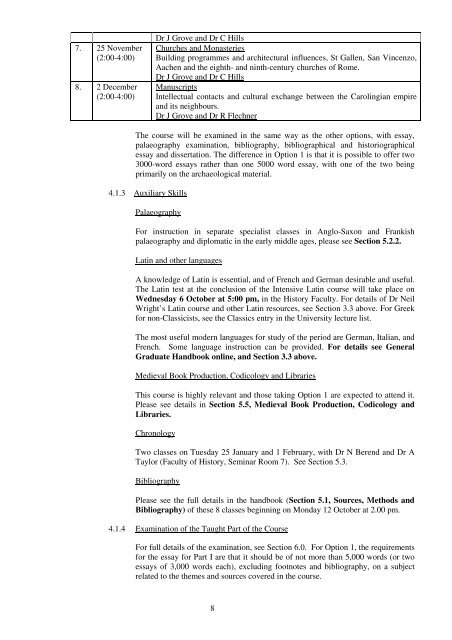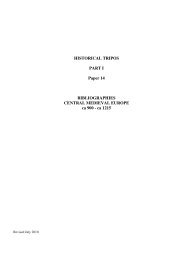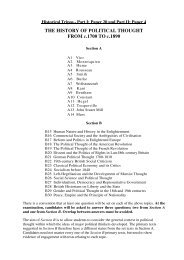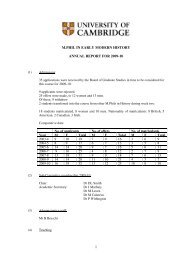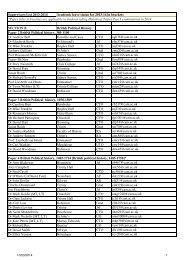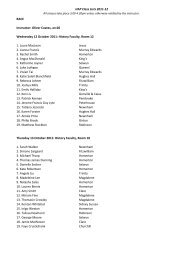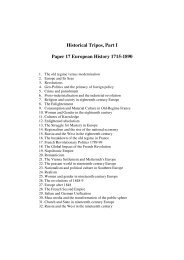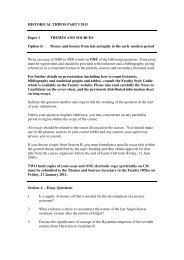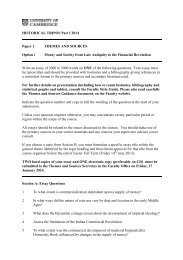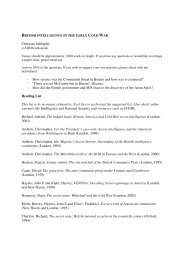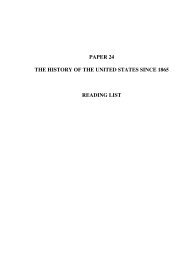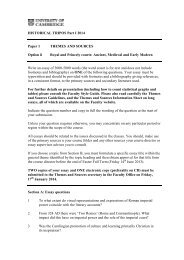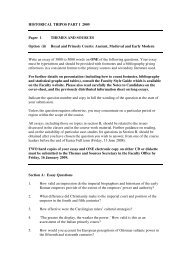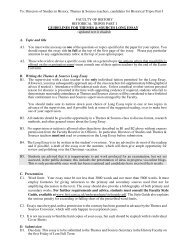Course Handbook - Faculty of History
Course Handbook - Faculty of History
Course Handbook - Faculty of History
You also want an ePaper? Increase the reach of your titles
YUMPU automatically turns print PDFs into web optimized ePapers that Google loves.
7. 25 November<br />
(2:00-4:00)<br />
8. 2 December<br />
(2:00-4:00)<br />
Dr J Grove and Dr C Hills<br />
Churches and Monasteries<br />
Building programmes and architectural influences, St Gallen, San Vincenzo,<br />
Aachen and the eighth- and ninth-century churches <strong>of</strong> Rome.<br />
Dr J Grove and Dr C Hills<br />
Manuscripts<br />
Intellectual contacts and cultural exchange between the Carolingian empire<br />
and its neighbours.<br />
Dr J Grove and Dr R Flechner<br />
The course will be examined in the same way as the other options, with essay,<br />
palaeography examination, bibliography, bibliographical and historiographical<br />
essay and dissertation. The difference in Option 1 is that it is possible to <strong>of</strong>fer two<br />
3000-word essays rather than one 5000 word essay, with one <strong>of</strong> the two being<br />
primarily on the archaeological material.<br />
4.1.3 Auxiliary Skills<br />
Palaeography<br />
For instruction in separate specialist classes in Anglo-Saxon and Frankish<br />
palaeography and diplomatic in the early middle ages, please see Section 5.2.2.<br />
Latin and other languages<br />
A knowledge <strong>of</strong> Latin is essential, and <strong>of</strong> French and German desirable and useful.<br />
The Latin test at the conclusion <strong>of</strong> the Intensive Latin course will take place on<br />
Wednesday 6 October at 5:00 pm, in the <strong>History</strong> <strong>Faculty</strong>. For details <strong>of</strong> Dr Neil<br />
Wright’s Latin course and other Latin resources, see Section 3.3 above. For Greek<br />
for non-Classicists, see the Classics entry in the University lecture list.<br />
The most useful modern languages for study <strong>of</strong> the period are German, Italian, and<br />
French. Some language instruction can be provided. For details see General<br />
Graduate <strong>Handbook</strong> online, and Section 3.3 above.<br />
Medieval Book Production, Codicology and Libraries<br />
This course is highly relevant and those taking Option 1 are expected to attend it.<br />
Please see details in Section 5.5, Medieval Book Production, Codicology and<br />
Libraries.<br />
Chronology<br />
Two classes on Tuesday 25 January and 1 February, with Dr N Berend and Dr A<br />
Taylor (<strong>Faculty</strong> <strong>of</strong> <strong>History</strong>, Seminar Room 7). See Section 5.3.<br />
Bibliography<br />
Please see the full details in the handbook (Section 5.1, Sources, Methods and<br />
Bibliography) <strong>of</strong> these 8 classes beginning on Monday 12 October at 2.00 pm.<br />
4.1.4 Examination <strong>of</strong> the Taught Part <strong>of</strong> the <strong>Course</strong><br />
For full details <strong>of</strong> the examination, see Section 6.0. For Option 1, the requirements<br />
for the essay for Part I are that it should be <strong>of</strong> not more than 5,000 words (or two<br />
essays <strong>of</strong> 3,000 words each), excluding footnotes and bibliography, on a subject<br />
related to the themes and sources covered in the course.<br />
8


